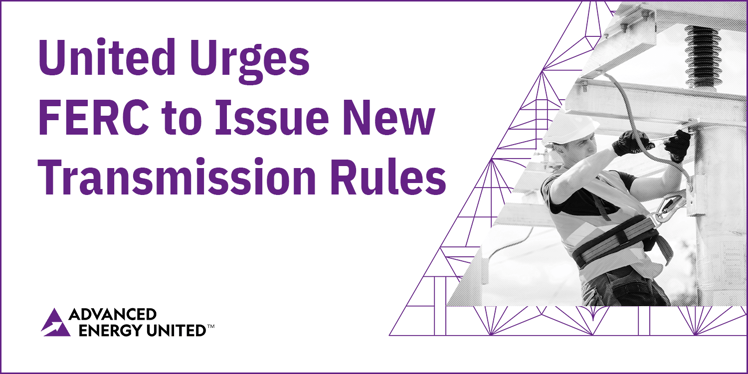
The United States electric grid is undergoing a transformation and significant changes need to occur for Americans to fully realize the benefits of these improvements. The key is the transmission system. As the federal agency charged with regulating interstate transmission of electricity, the Federal Energy Regulatory Commission (FERC) is uniquely positioned to create new rules that better ensure Americans can achieve equitable, affordable access to energy, secure our grid’s future reliability, and accelerate the transition to clean generation and advanced grid technologies.
That’s why we recently joined with several business, science, conservation, environmental, and environmental justice organizations in sending a letter to FERC commissioners urging them to finalize and issue a strong new regulatory framework for electric transmission planning and cost allocation as quickly as possible.
In the letter, United and the other organizations implored the Commissioners to adopt rules that include at least the following elements:
- Transmission planning must plan over the long term and consider multiple scenarios. Transmission should be planned to meet the expected future resource mix, as indicated by consumer demand and state, local, and federal public policy incentives and directives. Transmission providers must perform long-term (at least 20-year), forward-looking assessments of supply and demand levels. They must set a baseline for factors and inputs that must be included in scenarios, including planning for state clean energy laws and policies, scenarios with high renewable penetration, and higher demand for electricity due to electrification. They must also allow all stakeholders to have a voice in this process.
- Transmission planners must plan for all the benefits of transmission. Scenarios must evaluate all benefits that transmission projects would deliver and use these assessed benefits as a basis for project selection. This must include all economic benefits, such as congestion relief and generation and transmission cost optimization, as well as reliability and resilience benefits.
- Cost allocation standards must be clear and certain. FERC must ensure that any cost allocation methodology agreed to by states complies with the “beneficiary pays” principle by showing that the methodology considers all quantifiable benefits of transmission. The Commission also should create a default cost allocation policy that meets this same standard to be applied if the relevant states cannot come to an agreement. Cost allocation needs to be determined at the start of the planning process to minimize delays. FERC needs to have a default cost allocation policy as a backstop so that arguments over cost allocation do not lead to undue delays in planning for and building new transmission.
Some utilities are asking for a different approach, recommending instead that FERC implement a federal “right of first refusal” that would allow incumbent transmission utilities the exclusive rights to build, maintain, and own transmission lines in their service territories.
The approach recommended by the utilities would eliminate competition for investment in projects, missing out on an excellent way to reduce costs and maximize the efficiency of the transmission system. A FERC rule that encourages competition would help hold electricity bills down, ensure reliability, keep people safe during extreme weather, and accelerate progress towards a clean energy economy.
Click here to view or download the letter.
Learn more about Advanced Energy United’s work to eliminate barriers and expand opportunities for advanced energy technologies to participate in competitive wholesale markets.